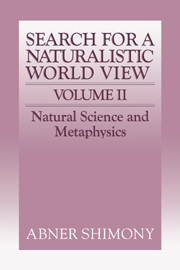Book contents
- Frontmatter
- Contents
- A MEASUREMENT IN QUANTUM MECHANICS
- 1 Role of the observer in quantum theory
- 2 Approximate measurement in quantum mechanics
- 3 Proposed neutron interferometer test of some nonlinear variants of wave mechanics
- 4 Desiderata for a modified quantum dynamics
- 5 Filters with infinitely many components
- 6 Proposed neutron interferometer observation of the sign change of a spinor due to 2π precession
- B QUANTUM ENTANGLEMENT AND NONLOCALITY
- C COMPLEX SYSTEMS
- D TIME
- E THE MENTAL AND THE PHYSICAL
- Index
1 - Role of the observer in quantum theory
Published online by Cambridge University Press: 05 June 2012
- Frontmatter
- Contents
- A MEASUREMENT IN QUANTUM MECHANICS
- 1 Role of the observer in quantum theory
- 2 Approximate measurement in quantum mechanics
- 3 Proposed neutron interferometer test of some nonlinear variants of wave mechanics
- 4 Desiderata for a modified quantum dynamics
- 5 Filters with infinitely many components
- 6 Proposed neutron interferometer observation of the sign change of a spinor due to 2π precession
- B QUANTUM ENTANGLEMENT AND NONLOCALITY
- C COMPLEX SYSTEMS
- D TIME
- E THE MENTAL AND THE PHYSICAL
- Index
Summary
In quantum theory as it is currently formulated the measurement of an observable quantity of a physical system is the occasion for a change of state of the system, except when the state prior to the measurement is an eigenstate of the observable. Two proposals for interpreting this kind of change are examined in detail, and several variant proposals are considered briefly. According to the interpretation proposed by von Neumann, and by London and Bauer the change of state is completed only when the result of the observation is registered in the observer's consciousness. Although this interpretation appears to be free from inconsistencies, it is not supported by psychological evidence and it is difficult to reconcile with the inter subjective agreement of several independent observers. According to the interpretation proposed by Bohr, the change of state is a consequence of the fundamental assumption that the description of any physical phenomenon requires reference to the experimental arrangement. Bohr's proposals are valuable as practical maxims in scientific theory, but they are shown to involve the renunciation of any ontological framework in which all types of events – physical and mental, microscopic and macroscopic – can be located. It is concluded that a satisfactory account of the observation of microphysical quantities is unlikely if the present formulation of quantum theory is rigorously maintained.
INTRODUCTION
There are two distinct problems concerning the relationship between physical objects and consciousness.
- Type
- Chapter
- Information
- The Search for a Naturalistic World View , pp. 3 - 33Publisher: Cambridge University PressPrint publication year: 1993



